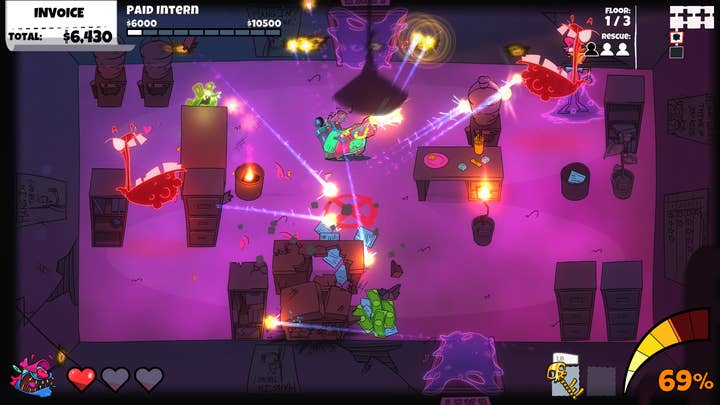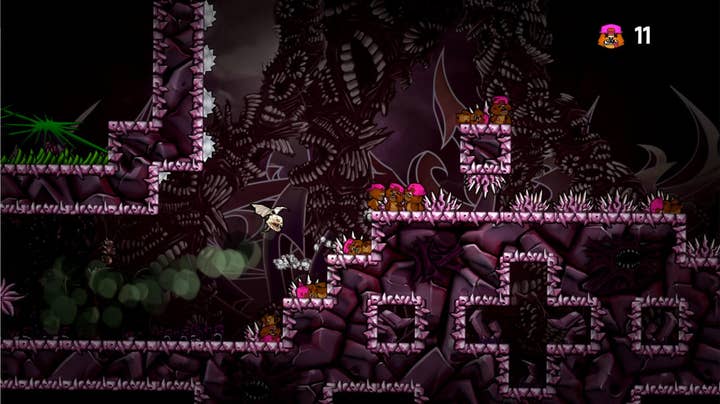Ant Workshop: "Accessibility does not mean making your game easier"
Dead End Job developer Tony Gowland discusses how indies can reach beyond - but still satisfy - core gamers
Difficulty is a challenging thing. Make your game too hard and you could limit your audience. Make it too easy and it might not be enough to tempt players away from the other games vying for their attention.
But Ant Workshop's Tony Gowland believes it's possible to strike a balance between both, and he's attempting to prove it with his upcoming action game Dead End Job.
Aiming for release on PC and consoles (including Switch) in 2019, the game puts players to work for a paranormal pest control company, sending them to various locations levels to suck up ghostly critters and rescue their victims. It's a frantic title that, in Gowland's words, aims to "make a hardcore genre accessible" - although this wasn't necessarily the goal when he started.

"When we started making Dead End Job, I really wanted to do a twin-stick shooter or something that felt like Luigi's Mansion, that nice kind of vibe," Gowland recalls. "My art direction to my artist was really light and broad. There were two points: I didn't want it to be pixel art, because there are a lot of pixel art games. I wanted a bright art style that grabs people's attention. That's what he has delivered, but he's almost done it too well."
The result is a visual style reminiscent of Nineties cartoons like Ren & Stimpy. Combined with its comical title, Dead End Job has been able to turn heads when displayed at events like EGX Rezzed. The Ghostbusters-esque premise has also proven to be appealing to passing crowds, but early demos identified an unforeseen problem.
"What we found - and it was something that took us by surprise - was that twin-stick shooters are quite difficult for a lot of people," says Gowland. "We always thought that twin-stick shooters were something that people could understand; you move with one stick and aim with the other. Especially in an event like Rezzed where people have paid £20 to go along - they are gamers. But when we were actually getting people coming and playing it, we were finding that that's not true at all. A lot of people were moving around with the left stick but were asking how they turn around.
"We realised that art style casts a broader net. If we had gone for a pixel art thing, we'd have got people who were more of the audience that were already into these kinds of games. Our vibe and audience is reaching a lot wider than that. It was a little heartbreaking to see so many people struggling with it, but having come through that, it's really given us a lot more definition of what it is we are creating and the audience we are creating it for."
The revelation prompted some considerable rethinking for Dead End Job. How could Gowland ensure the game was fun for the hardcore players that enjoy the genre, while still satisfying the sort of people that might be caught by the art style as they browse a digital store?
"It's funny to watch YouTubers play super tough games and swearing away at it, but you need more than that, you need more people to play it."
To begin with, he reflected on what it is about the twin-stick shooter that hardcore gamers enjoy, and how these are present in Dead End Job. One aspect he identified was that those players liked the item system: discovering new objects hidden throughout each level and experimenting with their effects, whether separate or combined. This helps give the game a little more depth that's appealing to avid gamers, but it's not essential for those new to the genre.
For those who were struggling, Gowland introduced context-sensitive assistance to the controls in a subtle a way as possible.
"It's actually a twin-stick shooter that you can play with just one joystick if you aren't used to using the other stick to aim," he explains. "If the game realises you aren't using the second stick, it does a lot of aim assist and really helps you out. If you are firing and holding down the fire button with an enemy in front of you, the game will lock you on to that. You can start circle-strafing around enemies just using the left stick. [I wanted to] have those things where people can do cool stuff and get that manoeuvrability that you would have from using both sticks, but without needing them what is quite a difficult control system."
It's a smart solution, but also the sort of thing that prompts complaints from the (extremely) vocal minority via Twitter. Nintendo, for example, faced a backlash when it introduced an Invincibility mode to Star Fox Zero, or various free power-ups after a set number of deaths in past Mario games to get struggling players to the end of a level. These features, as with Dead End Job's controls, do not affect anyone who is determined to press on and play the game 'as intended', but their very presence was considered an affront to certain core gamers.
"As a small indie, you don't have a lot of people on your team. You're very, very familiar with your game and don't necessarily realise the things people just can't understand"
"Some people simply can't play games in the same way that other people can," Gowland reasons. "I have a couple of young kids, and you see the way they play stuff. [I would love] a mode that would help my son play through the game and keep enjoying it, rather than what you used to have to do: get to a difficult bit and then get your dad to do it - and then it turns out I genuinely can't do it either. Having the thing that helps people through stuff... people react badly to it if they know about it. Whereas I know there's actually a lot of games that do this stuff that people don't know."
Does this outcry suggest there's a misconception that making a game accessible means making it easy for everyone? Certainly, that seems to be the vibe from the outcry over Nintendo's solutions, and yet why shouldn't games be made playable for all? It's a stance Xbox shares with the announcement of its new Adaptive Controller - something we spoke to consulting charity SpecialEffect about on our latest podcast.
Gowland, too, points to the work of SpecialEffect and several charities like it as examples of getting more people into games. He stresses that any efforts developers make themselves don't have to take away from what can still be a challenging title.

"Accessibility and the difficulty of a game are essentially two different things," he says. "Just because some people simply don't have the motor coordination... You see the fantastic work that charities are doing in terms of helping people play games. Some people just don't have the coordination to do those kinds of things. That doesn't mean making the game easier.
"In Dead End Job's case, if you are playing it as a twin-stick shooter, you might never even realise that if you weren't using both sticks it's going to do this extra stuff to help you out. It's still got the systems, and there's still the ability for people to master the game more deeply if you are one of those more hardcore players. But it's just allowing people to gradually dip their toe in."
"That's a thing that a lot of people do find quite hard to come at from a development standpoint. As a small indie, you don't have a lot of people on your team. You're very, very familiar with that game and you don't necessarily realise the things that people just can't understand."
"It's easier to make stuff hard. It's easy to make game modes that make things harder for people that want that. A difficult thing for indies is to make things easier."
He also points to AAA blockbusters like Call of Duty and Grand Theft Auto. While these games still have plenty of options and mechanics that make them challenging enough for avid gamers, the reason their audiences are so broad is because they're also accessible - not only to less-skilled gamers, but even to those who aren't as involved in the hobby.
"Rockstar does a lot of stuff for GTA that helps you out quite a lot," Gowland says. "They have this approach of: 'If we're going to sell this game to hundreds of millions of people, not all of those people are going to be playing games all the time'. Some of those people will buy two games a year. A lot of indies focus too much on too hardcore a focus of their target demographic."
He continues: "Games should help people play them, really. I have a couple of kids. Between work and family and loads of other things, I have about four hours a week to sit and play games, so I play through stuff and I want to get through things. In my four hours a week, I don't want to sit there and struggle on one level and then feel like I have wasted four hours. I want to play through things. I have found, as my priorities in life have changed, that I want to play things that help me. There's difficult and then there's frustrating, and I think a lot of indies have trouble balancing their games."

Indeed, this is now a big focus for Dead End Job. At every event Gowland attends, he and his team watch carefully when people play. If there's a certain area where they consistently fail, Ant Workshop will tweak this for the next build and test at another event. The aim is to reach the point where hardened twin-stick shooter fans believe the game to be fairly easy - to which Gowland will point out this is a demo, and there will be more challenge in the final product.
In fact, Gowland urges his fellow developers to regularly showcase their games - not just at industry events, but at public ones where families and young kids are playing. This will ensure you're not just gaining feedback from a hardcore crowd.
Overall, Ant Workshop is determined to grow beyond their previous release, Binaries: a 2D puzzle platform Gowland describes as "super super difficult, but deliberately difficult."
"I genuinely think that affected the sales of it," he admits. "I don't think people want frustrating stuff. At that point, you are marketing your indie game to a really, really small audience of people who want to be annoyed by things. It's funny to watch YouTubers play super tough games and swearing away at it, but you need more than that, you need more people to play it.
"If you look at something like Alex Rose's Super Rude Bear Resurrection, that is a brilliant example of a game where the difficulty by its mechanic is kind of core to the game. The more often you die, the easier the game gets because now the spikes are covered by the body of your previous life.That difficulty balancing is inert to that kind of experience, but also it's got the mode into it where there are one-hit-kills, where you have one life and that kind of stuff.
"That's the thing - it's easier to make stuff hard. It's easy to make game modes that make things harder for people that want things harder. A difficult thing for indies is to make things easier."

